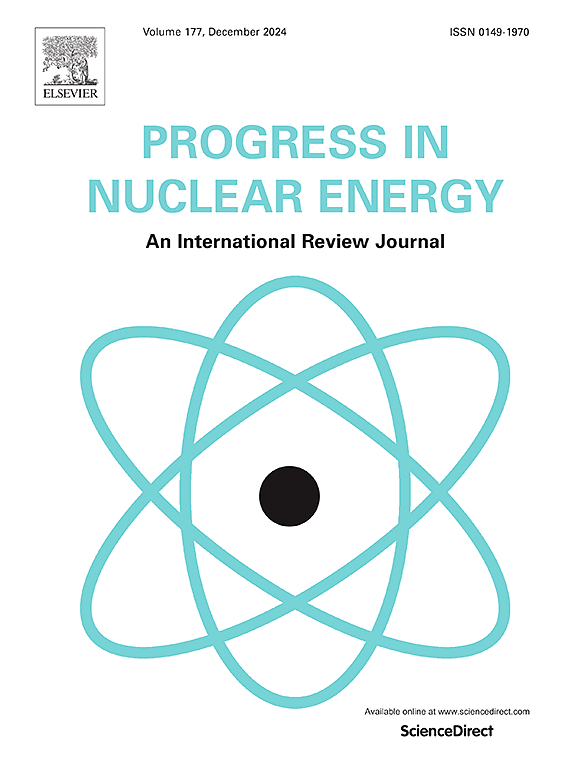Temperature effect on the oxygen control efficiency of LSCF-type oxygen pump for LBE
IF 3.3
3区 工程技术
Q1 NUCLEAR SCIENCE & TECHNOLOGY
引用次数: 0
Abstract
As a control component for dissolved oxygen concentration in the coolant of lead-cooled fast reactor, the electrochemical oxygen pump has proven to be effective. Temperature is a critical factor affecting the efficiency of oxygen pumps in controlling oxygen levels. However, there is currently a lack of quantitative research to elucidate the underlying mechanisms of this influence. This paper focuses on the effect of temperature on the oxygen control performance of an oxygen pump. Multi-cycle oxygen control experiments were conducted using an oxygen pump with La0.6Sr0.4Co0.2Fe0.8O3+δ(LSCF) as the cathode powder within the temperature range of 350–500 °C. The experimental results indicate that the oxygen control efficiency of the oxygen pump increases with rising temperature. At each temperature within a single oxygenation-deoxygenation cycle, the oxygenation rate was significantly higher than the deoxygenation rate. The oxygenation rate remains relatively constant, while the deoxygenation rate gradually diminishes and approaches zero, ultimately reaching the deoxygenation limit, which increases as the temperature decreases. Additionally, with prolonged oxygen control time, the deoxygenation limit of the oxygen pump shows a certain degree of increase.
温度对lscf型LBE氧泵控氧效率的影响
作为铅冷快堆冷却剂溶解氧浓度的控制元件,电化学氧泵已被证明是有效的。温度是影响氧泵控制氧含量效率的关键因素。然而,目前缺乏定量研究来阐明这种影响的潜在机制。研究了温度对氧泵氧控性能的影响。在350 ~ 500℃的温度范围内,以La0.6Sr0.4Co0.2Fe0.8O3+δ(LSCF)为阴极粉,在氧气泵上进行了多循环氧控实验。实验结果表明,氧泵的控氧效率随温度的升高而提高。在单次加氧-脱氧循环的各温度下,加氧速率均显著高于脱氧速率。氧化速率保持相对恒定,而脱氧速率逐渐减小并趋近于零,最终达到脱氧极限,脱氧极限随温度的降低而增大。另外,随着控氧时间的延长,氧泵的脱氧极限也有一定程度的提高。
本文章由计算机程序翻译,如有差异,请以英文原文为准。
求助全文
约1分钟内获得全文
求助全文
来源期刊

Progress in Nuclear Energy
工程技术-核科学技术
CiteScore
5.30
自引率
14.80%
发文量
331
审稿时长
3.5 months
期刊介绍:
Progress in Nuclear Energy is an international review journal covering all aspects of nuclear science and engineering. In keeping with the maturity of nuclear power, articles on safety, siting and environmental problems are encouraged, as are those associated with economics and fuel management. However, basic physics and engineering will remain an important aspect of the editorial policy. Articles published are either of a review nature or present new material in more depth. They are aimed at researchers and technically-oriented managers working in the nuclear energy field.
Please note the following:
1) PNE seeks high quality research papers which are medium to long in length. Short research papers should be submitted to the journal Annals in Nuclear Energy.
2) PNE reserves the right to reject papers which are based solely on routine application of computer codes used to produce reactor designs or explain existing reactor phenomena. Such papers, although worthy, are best left as laboratory reports whereas Progress in Nuclear Energy seeks papers of originality, which are archival in nature, in the fields of mathematical and experimental nuclear technology, including fission, fusion (blanket physics, radiation damage), safety, materials aspects, economics, etc.
3) Review papers, which may occasionally be invited, are particularly sought by the journal in these fields.
 求助内容:
求助内容: 应助结果提醒方式:
应助结果提醒方式:


